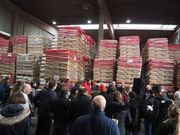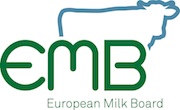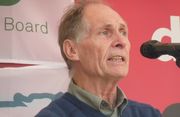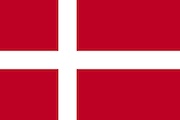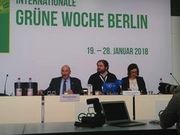EMB Newsletter February 2018
Newsletter as PDF
Contact
EMB - European Milk Board asbl
Rue de la Loi 155
B-1040 Bruxelles
Phone: +32 - 2808 - 1935
Fax: +32 - 2808 - 8265
Dear dairy farmers, dear interested parties,

The issue of milk powder is making waves: On 24 January, we visited the Belgian milk powder storage facility in Herstal. The European Milk Board invited MEPs, dairy farmers and journalists to come and see for themselves, what public intervention looks like. In Wallonia's largest storage facility, sacks of milk powder are piled ceiling high. A total 12,600 tonnes of skimmed milk powder is stored here.
The innumerable pallets of milk powder were a striking image not for the EU policy-makers and journalists alone. Even those milk producers present were taken aback by this packed warehouse. Our production is not aligned with the market – There could be no better way to demonstrate the effects of overproduction and misguided EU policy.
Around 380,000 tonnes of skimmed milk powder are sitting in Europe's storage facilities and are losing value day by day. The warehouse in Herstal is just 3 per cent of the total volume – milk powder that is nearing its expiry date and that no one wants.
All of 2,000 tonnes have been sold since December 2016, that too at the rock-bottom price of €1,190/tonne. It is clear that this milk powder is a burden on the market and will eventually come back to haunt milk producers.
Agriculture Commissioner Hogan wants to pull in the reins and halt the purchase of more milk powder for public intervention storage. On 29 January, the Agriculture Ministers decided to offer no intervention at a fixed price in 2018. The EU will accept skimmed milk powder between March and September solely through the tendering process. This means that powder will no longer be automatically bought up for intervention once a certain threshold is reached, but a decision on whether the powder will be bought and at what price shall be taken on a case by case basis. In the meantime, production continues full speed ahead…
Agriculture Commissioner Hogan is looking to help the dairy market with this decision, but is ignoring the fact that production volume is what needs to be addressed. If intervention is simply stopped without any reduction in volumes, the dairy market will end up flooded.
Hogan would be well-advised to rethink the Common Agricultural Policy and immediately set up a reduction programme that reacts to the current state of production – like the EMB's Market Responsibility Programme!
Kjartan Poulsen, EMB Executive Committee member and President of LDM Denmark
Visit to EU milk powder storage facility
Council Decision on intervention skimmed milk powder - Statement of the European Milk Board
With the limitation of intervention, a dairy crisis is imminent
Danish labour law: trade unions put pressure on farmers
Switzerland: Migros' sustainable milk project
Successful crisis management in the EU – What are the lessons to be learnt from the last three years?
20 years of the BDM = 20 years of extraordinary commitment
Impressum
European Milk Board asbl
Rue de la Loi 155
B-1040 Bruxelles
Phone: +32 2808 1935
Fax: +32 2808 8265
E-Mail: office@europeanmilkboard.org
Website: http://www.europeanmilkboard.org

